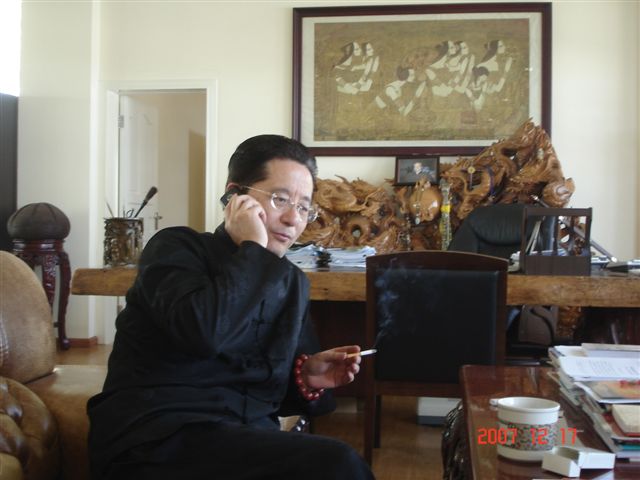
CEOs Hunker Down During Crisis
After the financial shocks of September and October, executives running businesses ranging from hair salons to giant utilities are hunkering down by trimming capital-spending budgets, delaying plant construction, laying off workers and skimping on pay raises.
Their actions are a sign that the crisis is still reverberating through the economy and could continue to do so for months.
Business leaders put large fiscal stimulus atop their to-do list for Barack Obama, saying the president-elect should seek to enact a program of tax cuts and spending increases in excess of $300 billion.
The proposal was among more than a dozen conceived by top executives to solve some of the nation's deepest problems, from the ailing economy to underperforming schools, high health-care costs and environmental worries.
Proposals included a push for electric cars, improvements in kindergarten through 12th-grade education, a fight against obesity, revived global-trade talks, tort reform and new gasoline taxes.
Fiscal stimulus ranked highest among the executives' goals. Just a few weeks ago, many economists pointed to stimulus in the range of $150 billion to $200 billion. The group said more was needed. A $300 billion program, if implemented in one year, would amount to a little more than 2% of the nation's $14 trillion gross domestic product.
The executives said obesity should be the top priority of the nation's surgeon general. The goal for electric cars, they said, should be 10% of the nation's total car fleet by 2020 and up to 50% of the fleet by 2030. They also exhorted the new administration to restart the Doha round of global trade talks. -- Jon Hilsenrath
Aluminum company Alcoa Inc. is idling about 400,000 metric tons of smelting capacity; American Electric Power Co. is cutting back on merit-pay increases and new hiring next year; Regis Corp., a Minneapolis-based hair-salon company, is slashing three-quarters of its capital-expenditure and merger-and-acquisition budgets; advertising company WPP Group PLC is scaling back share repurchases, dividend growth and merger plans.
"We're simply tightening our belt," says James Griffith, chief executive of Timken Co., an Ohio-based manufacturer. The firm is still experiencing growth in Asia, but hopes to reduce costs by more than $100 million in 2009.
CEOs gathered in Washington for The Wall Street Journal CEO Council, a meeting of top executives and policy makers aimed at discussing critical issues facing President-elect Barack Obama's incoming administration. Topics such as health, energy and the environment were high on the agenda, though none trumped executives' concern about the economy.
After the technology bubble burst in 2001, skittish executives continued pulling back well after the recession ended, contributing to a long period of languishing economic growth. A similar dynamic could hang over this cycle.
"There is a risk that it would be the steepest decline in the post-war period," said Laurence Meyer, a former Federal Reserve governor, in comments to the group. He projected a 4% annualized contraction in output in the fourth quarter and a 2% annualized drop in the first quarter, with the U.S. unemployment rate exceeding 8% by the end of next year. That forecast doesn't include the impact of potential fiscal stimulus, which many executives said should be a priority for Mr. Obama.
Asked at a Tuesday session "how long will it be until the U.S. economy returns to a normal growth rate," almost 80% were bracing for a slow economy for at least two years. Just one out of 93 CEOs, voting by electronic device, said it will be six months.
Michael Morris, CEO of American Electric Power in Columbus, Ohio, said the company won't undertake new hiring in 2009. The firm's existing 22,000 employees also won't see the typical merit raises of 2%-3% in the first half of 2009 and perhaps not for the entire year, he said.
Alcoa CEO Klaus Kleinfeld said his company could squeeze its capital-expenditure budget by more than $500 million just to "get through the crunch."
At the WSJ's CEO Council, Jon Hilsenrath summarizes how CEOs he has spoken with are adapting their businesses to deal with the ongoing financial crisis. (Nov. 18)
"It's bad out there. People just aren't shopping," said Regis CEO Paul Finkelstein. Consumers are showing signs of turning more frugal, either by having friends cut their hair or spending less. His company's lower-priced Supercuts chain is doing much better than his higher-end Regis chain of salons.
He laid off about 9% of the company's headquarters staff of 1,500 in Minneapolis. "What you don't want." Mr. Finkelstein said, are "some layoffs here and there." It is better for the remaining employees to know cuts were made cleanly and completely, he said.
Some companies do show signs of regaining stability after the financial shocks. James Owens, CEO of Caterpillar Inc., said his company based in Peoria, Ill., has laid off just 120 employees of 112,000, and 1,000 outside contractors since June. The maker of earth-moving and other heavy equipment is still expecting $50 billion in sales and revenue, and $6 per share in earnings, for 2008, and expects similar numbers in 2009.
Sir Martin Sorrell, CEO of WPP Group PLC, said his company ratcheted down its share-buyback program from about 5% a year to 3% in 2008 and plans to take it to about 1% for 2009, in an effort to preserve cash.
"I think 2009 will be a very difficult year.…The regular economy will return in 2010," Mr. Sorrell said.
